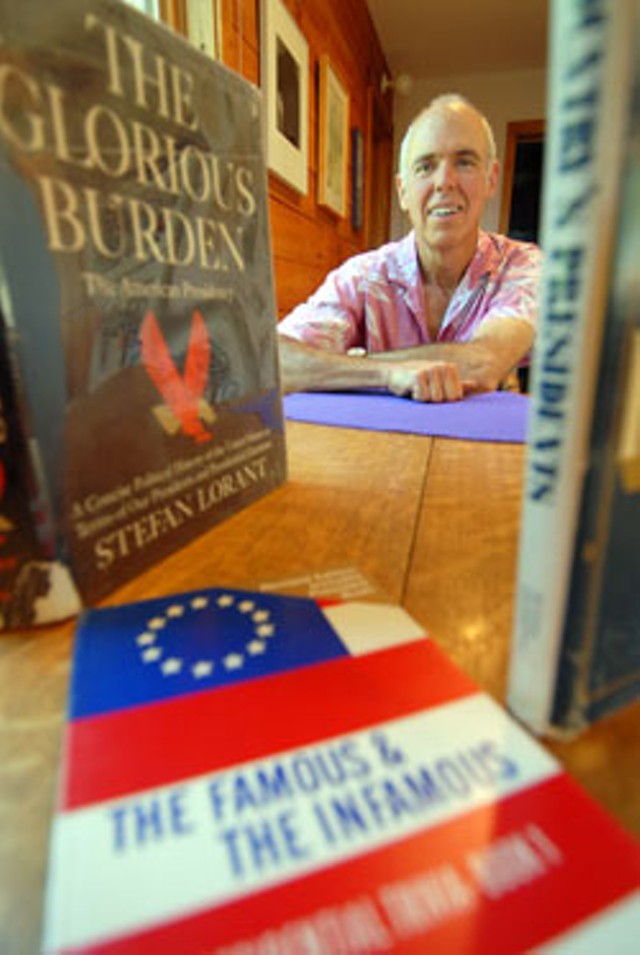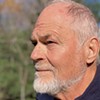Published August 27, 2008 at 5:59 a.m.
One day about 12 years ago, Plainfield poet Charles Barasch had a vision: It was “Bobo Brazil,” the first African-American professional wrestling champion, pinning former President Richard Nixon to a mat. And there, staring incredulously from an imagined grandstand, was Nixon’s wife Pat.
Barasch, a speech pathologist, town moderator and baseball umpire who inks crossword puzzles for The New York Times, picked up his pen and set to work on a Nixon-inspired poem, rendering it in the protagonist’s own voice. He then wrote similar verses about Presidents Buchanan, Jefferson, Pierce and Wilson. On and on Barasch went for the next 10 years, creating presidential portraits following the twists and turns of his creative process and the literary footsteps of famous poets Robert Bly and William Carlos Williams.
By 2006, Barasch had written dream sequences in the voices of all 43 U.S. presidents, including one in which an airborne George W. Bush declares, “I realize I don’t know how to fly.” After a few unsuccessful queries to literary agents, Barasch sent his manuscript to Berkeley, California-based North Atlantic Books, and the independent publisher agreed to put out Dreams of the Presidents in September 2008.
A slender volume that traverses 232 years of history in a mere 104 pages, Dreams is at once breezy and politically astute. Fifty-eight-year-old Barasch doesn’t take his presidents too seriously — Martin Van Buren muses for a full stanza on the pleasures of his new White House bathtub, for example, and Andrew Johnson converses with characters from Lewis Carroll’s trippy 1865 novel Alice in Wonderland. At the same time, however, the soft-spoken poet uses crystal-clear objective correlatives — T. S. Eliot’s term for hard facts in poetry — to indict presidents for human rights violations and moral missteps.
Most of Barasch’s “dream” poems feature a string of off-beat images loosely grounded in progressive-leaning historical narratives — imagine fantastical filmmaker Federico Fellini consulting with historian Howard Zinn. Why write about dreams? Friend and fellow Vermont poet Judy Chalmer suggests they allow Barasch to pull quirky facts from his encyclopedic brain without fussing over chronological order or reportorial accuracy. “He doesn’t have to worry about fictionalizing history,” she notes. “It’s all transparently fanciful.”
Consider “Franklin Roosevelt’s Dream,” a two-page poem written, like its 42 cousins, in unrhymed blank verse. The opening features Roosevelt lounging on a movie set with movie star Fred Astaire. A few lines later, the polio-afflicted president is seated in his wheelchair, gazing at a ship that looms on the horizon. As Roosevelt stares from shore, people with “fearful faces” stretch their arms out to him from behind the ship’s railings.
A yarmulke washes ashore. Roosevelt tries to wheel himself away — out of shame? guilt? — but finds his chair won’t budge. Notes to Barasch’s poem explain that in 1939, the year World War II began, a German ocean liner carrying 9000 Jewish refugees docked in Cuba but was refused entry to the United States. As a result, many of the passengers died in concentration camps.
“I hadn’t thought of it before, but dreams bring out the things you’re trying to hide,” Barasch reflects, at home on a recent Thursday afternoon. Black-eyed Susans line his vegetable garden, and a screened porch offers a postcard-perfect view of Camel’s Hump.
In addition to war, Barasch explains, Dreams places particular emphasis on slavery and the mistreatment of Native Americans. (His publisher is sponsored by the Society for the Study of Native Arts and Sciences, a nonprofit founded in 1980 to “disseminate non-Western and new-paradigm arts and sciences.”)
But despite their myriad political allusions, Barasch’s “dream” poems are also deeply personal, notes Chalmer, who has worked with Barasch in the central Vermont-based writers’ group Acme Poets since 1988. Chalmer says her friend has always been a “gentle” writer; she feels Dreams is a reflection of a compassionate sensibility.
“His love poems are very much grounded in the sweetness of every day,” Chalmer observes, “and I think he has approached this book in a similar way by giving [the presidents] vulnerability and tenderness that is not generally exposed to the public.”
Indeed, even while calling attention to the presidents’ public follies, Barasch suffuses each man’s dream with heartfelt emotion, often insecurity. “I’m a bit confused,” admits President Zachary Taylor while riding a horse into battle. “I’ve become an old man,” notes James Buchanan when a lover finds him unattractive. “No one,” laments Chester A. Arthur, “will remember me.” Barasch’s political insights may be cutting, but these snippets of imagined dialogue encourage sympathetic responses to the leaders’ imagined inner turmoil.
By including such intimate confessions, Barasch explains, he hopes to persuade his readers to discard the “stodgy” images of presidents they remember from high school history class and to consider the men for what they were: fallible humans who were preoccupied with — what else? — sex and death. Barasch recalls that his 13-line closing poem about outgoing President George W. Bush was the hardest of all to complete, in part because Bush is “so easy to lampoon.” Adds the poet sans chuckle: “I felt bad for him after I wrote his dream.”
Barasch knows some politicians firsthand. His friend — and 2006 Vermont gubernatorial candidate — Scudder Parker points out that poets have an innate ability to understand the “irony” and “ambivalence” lurking beneath day-to-day politics. A poet who has swapped works with Barasch for years, Parker hasn’t yet read all the Dreams of the Presidents —Barasch was still correcting galley proofs as of last Friday. Based on what he has seen, though, Parker says he appreciates how his friend debunks the simplistic images of presidents created by electioneering and media spin. Barasch “gives people a whole different picture of what a president and his administration is like,” Parker asserts.
“We have these images of the presidents as very serious, mature people, and I’m sure they were,” Barasch says, reclining on his secluded porch. “But they must have had some childishness to them, especially subconsciously.”
Several people have already asked Barasch if he is working on poems about presidential candidates Barack Obama and John McCain. But, considering he hasn’t learned enough about either, he says, creating such a poem would be premature. The result, Barasch worries, “would really be political.”
From Dreams of the Presidents
Franklin Roosevelt's Dream
I sit in my wheelchair on a movie set
watching a Busby Berkeley routine, women
on their backs with legs raised perpendicular
to the dance floor, smiles stuck to their faces
beneath the stage lights, and place my cigarette
holder in my mouth. Fred Astaire leans
over the chair to give me a light, one leg
casually crossed before the other, and presents
Ginger Rogers, who leads me onto the floor.
I place my hand in the small of her back,
we whirl round and round,
and when she pulls away, our hands still connected,
I feel a delicious tension between us and draw
her close. Our cheeks lightly touch,
and I spin her away again,
letting go, do a little soft shoe.
I'm watched by a crowd
surrounded by brown-shirted men.
One of them taps my back, whispers,
"She's Jewish," drags Ginger into the crowd.
I see faces: Al Jolson, Fanny Bryce,
Sid Luckman, a shoemaker, a boy
I grew up with - I used to ask him
to show me his penis, just to be scared
by the round tip. Then I plunge
into a pool, a perfect swan dive, hurtling
deeper and deeper until my lungs
are bursting, and I zoom upward and break
through gasping for breath. Esther Williams
lounges in the water, smiles at me,
her face glistening wet beneath her pink
bathing cap with fake chrysanthemums,
her lipstick creamy. I want to kiss her,
but she disappears under the water.
I follow, mimicking her surface dive,
legs straight, toes pointed, and now we tumble
side by side, gracefully kicking and arching
our backs. She swims away, still underwater,
naked now except for her bathing cap,
a yellow star on her buttocks.
I try to follow but run out of breath.
I rush toward the sunlight filtering
through the water. I can't get to the top.
--
I'm on a beach in my wheelchair
facing the sea with a cigarette,
unholdered, in my mouth. A ship
drifts offshore. Fearful faces crowd
the rail, hands reach out to me.
A yarmulke bobs in the ocean. I try
to wheel away, but the chair won't move
in the sand, and the yarmulke
washes ashore at my feet. I wake up
shaking and pull the bell cord for someone
to help me out of bed.
More By This Author
Speaking of...
-

Video: Visiting the Wind Phone at the Lanpher Memorial Library in Hyde Park
May 2, 2024 -

Vermont Book Award Winners Announced
May 6, 2023 -

Vermont State Colleges Reverse Library Layoffs, Athletics Shakeup
Apr 24, 2023 -

Local Children's Book Buyers Offer Reading Recommendations
Nov 15, 2022 -

The Inaugural Green Mountain Book Festival Kicks Off This Weekend
Sep 21, 2022 - More »
Comments
Comments are closed.
From 2014-2020, Seven Days allowed readers to comment on all stories posted on our website. While we've appreciated the suggestions and insights, right now Seven Days is prioritizing our core mission — producing high-quality, responsible local journalism — over moderating online debates between readers.
To criticize, correct or praise our reporting, please send us a letter to the editor or send us a tip. We’ll check it out and report the results.
Online comments may return when we have better tech tools for managing them. Thanks for reading.












































